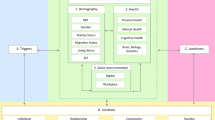Abstract.
Background: Relatively few studies have examined relationships between the social networks of people with psychotic disorder and other aspects of their functioning. The aim of this paper is to describe the social networks of people with psychosis and to investigate relationships between social networks and personal and occupational functioning, taking account of illness course. Methods: A two-phase epidemiological survey of persons with psychosis was conducted in four predominantly urban areas of Australia. A census and screen for psychosis was followed by a semi-structured interview of a stratified random sample of participants to assess their functioning. Data relating to functioning and social networks from 908 individuals (most with a diagnosis of schizophrenia) were analysed using structural equation modelling (SEM). Results: The majority of people with psychosis (67 %) had a network comprising of family and friends, 15 % were defined as having a family-dominated network, 11 % a friends-dominated network and 7 % of participants were defined as socially isolated (no family or friends). Participants who had friends and family in their network (12 %) or who had a family-dominated network (7 %) were more likely to be in full-time employment compared with those with a friends-dominated network (4 %) or those who were socially isolated (5 %). Dysfunction in self-care was more frequently reported among socially isolated people (50 %) and those with family-dominated networks (47 %) than among those with friends-dominated networks (35 %) and those who had friends and family in their social network (23 %). SEM revealed a strong association between social integration and functioning (r = 0.71), even after controlling for illness course. Social integration was defined as having contact with family and/or friends and functioning was defined as having employment and no difficulties in self-care. Male gender was associated with poorer self-care, and female gender was slightly, but significantly, associated with a greater likelihood of having friends. Conclusion: There is a strong relationship between social networks and functioning after taking account of course of illness. That is, the presence of family and friends is generally associated with better self-care and employment. Interventions that are targeted at improving social relationships are likely to have a positive impact on self-care and occupational functioning (and vice versa).
Similar content being viewed by others
Author information
Authors and Affiliations
Additional information
Accepted: 9 October 2002
Correspondence to Helen Evert
Rights and permissions
About this article
Cite this article
Evert, H., Harvey, C., Trauer, T. et al. The relationship between social networks and occupational and self-care functioning in people with psychosis. Soc Psychiatry Psychiatr Epidemiol 38, 180–188 (2003). https://doi.org/10.1007/s00127-003-0617-4
Issue Date:
DOI: https://doi.org/10.1007/s00127-003-0617-4




